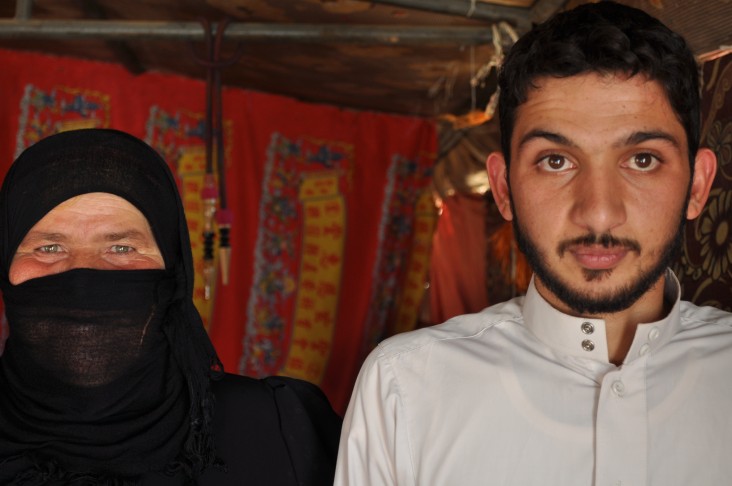
Fawzia Abdallah and her nephew Assem Abdallah. They fled Idlib Syria in 2012 with eight other members of their family, and eventually settled in Almanara Jordan, 30-40 kilometers from Mafraq.
Jessica Hartl, USAID
Thousands of Syrian families escaped conflict in their homeland, and are now living in Jordan
“It was hard to imagine. I had worked so hard, and my dream disappeared into thin air.”
November 2015—Assem Abdallah, 20, is much like the typical university student in the United States—bright, eager to learn. But he does not live in America. He was forced to flee his home in Idlib three years ago because of the conflict that has torn his country apart. Instead of studying economics, he now sits around his family’s tent all day in Jordan, frustrated and without the money to continue his studies.
Abdallah had just started the academic year when the conflict began. “It was hard to imagine. I had worked so hard, and my dream disappeared into thin air,” he said.
But his family of 10—his parents, aunt, three brothers and three sisters—couldn’t stay in Idlib, in northwestern Syria, without risking death. Abdallah’s dreams were put on hold so the family could stay safe.
When they decided to leave in 2012 because of intensive bombing, they were almost too scared to step out of the house. But they made their way south to Jordan, and eventually Za’atri refugee camp.
They didn’t stay long. After moving their tent several times around the city of Mafraq, in northern Jordan, they eventually ended up 30-40 kilometers west on the property of a farmer in Al Manara. The farmer lets them stay there for free, and provides free use of water and electricity. About 15 other Syrian families live on the same land.
Life hadn’t been too bad until this year. The U.N. World Food Program (WFP) reduced the family’s monthly vouchers for food assistance from $34 to $14 per person—not enough to buy basics like flour, barley, rice and sugar for their tea. Then WFP cut Abdallah’s family off entirely for September and October due to lack of funds.
The family had to rely entirely on the kindness of strangers and local charities that occasionally provided food. Until WFP partially restored food assistance to Abdallah’s family in late October, they were only eating tomatoes, eggplant and onions. They couldn’t even afford potatoes.
More Cuts, More Suffering
Fayad, Abdallah’s father, used to get $140 a month from the United Nations High Commissioner for Refugees (UNHCR) to treat his heart problems and to care for his two disabled daughters. But in the last eight months, they haven’t received any medical help, due to UNHCR cuts to their assistance.
For Abdallah, it has been rough: “I feel helpless, useless, because I can’t help my sisters.”
Going back to Syria would be a dream for the family. They miss their home and relatives dearly. “What we want are simply the basics,” his aunt Fawzia said. “Education, food vouchers at their original value, and caravans to replace our tent to protect us for the upcoming winter, especially my two disabled nieces. We need help and assistance to cope in this life.”
In late October 2015, WFP restored the $14 per person per month in food vouchers to the 229,000 Syrian refugees who had been cut off in September. WFP currently has enough funding to keep this level of assistance through January 2016.
LINKS







Comment
Make a general inquiry or suggest an improvement.